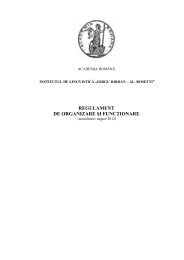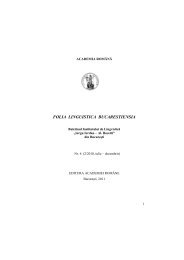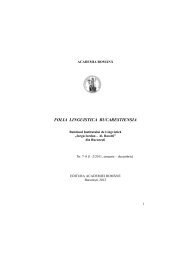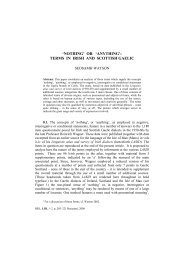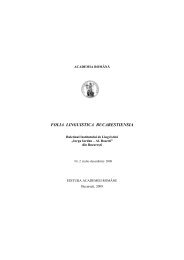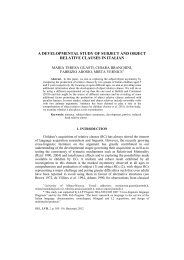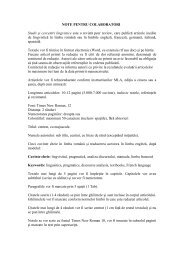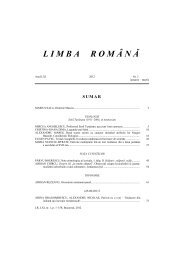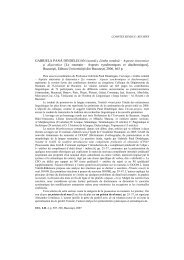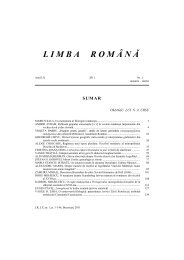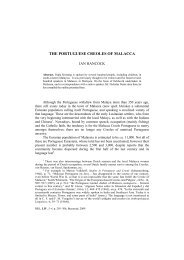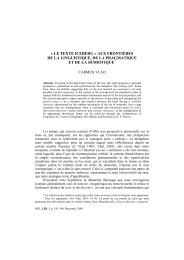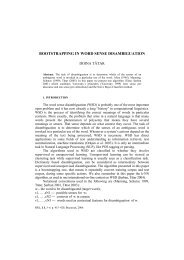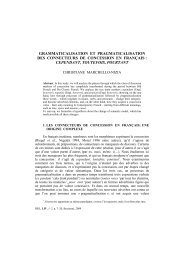PSEUDO-REDUPLICATION, REDUPLICATION AND REPETITION ...
PSEUDO-REDUPLICATION, REDUPLICATION AND REPETITION ...
PSEUDO-REDUPLICATION, REDUPLICATION AND REPETITION ...
Create successful ePaper yourself
Turn your PDF publications into a flip-book with our unique Google optimized e-Paper software.
226Andrei A. Avram 22. NUBINubi is a creole spoken in Uganda and Kenya (Owens 1985, Prokosch 1986,Pasch, Thelwall 1987, Owens 1989, 1997, 2001, Wellens 2003, Owens 2006,Khamis, Owens 2007).Nubi has several pseudo-reduplicated forms 2 in its Arabic-derived vocabulary:(1) a. du'gagdu'gag ‘small’ (Pasch, Thelwall 1987: 145, Miller 1993: 161)b. 'sim'sim ‘sesame’ (Wellens 2003: 60)c. watwat ‘fruit bat’ (Pasch, Thelwall 1987: 146)Whether du'gagdu'gag can be related to a simplex form du'gag is subject tocontroversy 3 . Simsim occurs in colloquial Sudanese Arabic (Miller 2003: 291). Asfor watwat, cf. Arabic watàwatà ‘bat’ (Wehr 1976: 1080). The vocabulary of Africanorigin also includes pseudo-reduplicated forms:(2) a. bangbang ‘fool’ (Wellens 2003: 213)b. godogodo ‘thin’ (Pasch, Thelwall 1987: 143, Miller 1993: 161)c. 'leǧa'leǧa ‘work on a free-lance basis’ (Wellens 2003: 214)d. ningning ‘complain’ (Pasch, Thelwall 1987: 143)e. 'nyanya ‘tomato’ (Pasch, Thelwall 1987: 142)Bangbang is from Acholi abaŋbaŋ (Wellens 2003: 213). Both godogodo andningning 4 are listed by Pasch and Thelwall (1987: 143) under the heading “Nubilexicon of unknown origin”. The etymon of 'leǧa'leǧa is Swahili rejareja (Wellens2003: 214). 'Nyanya is from Swahili nyanya ‘tomato’ (Pasch, Thelwall 1987: 142). 5Consider next reduplication. Miller (2003: 291) writes that “no reduplicatednouns have been recorded in Nubi”. In fact, noun reduplication does occur,although it “is not very common” (Wellens 2003: 60). Reduplication of nounsexpresses plurality (3a) or variety (3b):2 Also called “quasi-reduplicated forms” (Bakker 2003: 40), “phonological reduplicated baseform” (Miller 2003: 290), “fixed forms” or “fossilized forms” (Wellens 2003: 226).3 Pasch and Thelwall (1987: 145) and Miller (1993: 161) write that du'gag does not occur inNubi, but according to Tosco and Owens (1993: 249) it is attested with the meaning ‘children’.Dugag ‘small, esp. for children’ is recorded in Turku (Tosco and Owens 1993: 249). Miller (1993:161) states that du'gag is also recorded in Juba Arabic. However, the word is not listed in Smith andAma (1985) and, according to Tosco and Owens (1993: 249), is not attested in Juba Arabic.4 Wellens (2003: 213, f.n. 181) suggests a possible etymon. As shown in section 3, example(30c), ninging (Smith and Ama 1985: 164) / nyingnying (Miller 1993: 161) ‘nag’ is also recorded inJuba Arabic.5 Cf. Juba Arabic nyanya, glossed ‘food’ by Smith and Ama (1985: 165), but ‘food for babies’by Miller (1993: 161).



